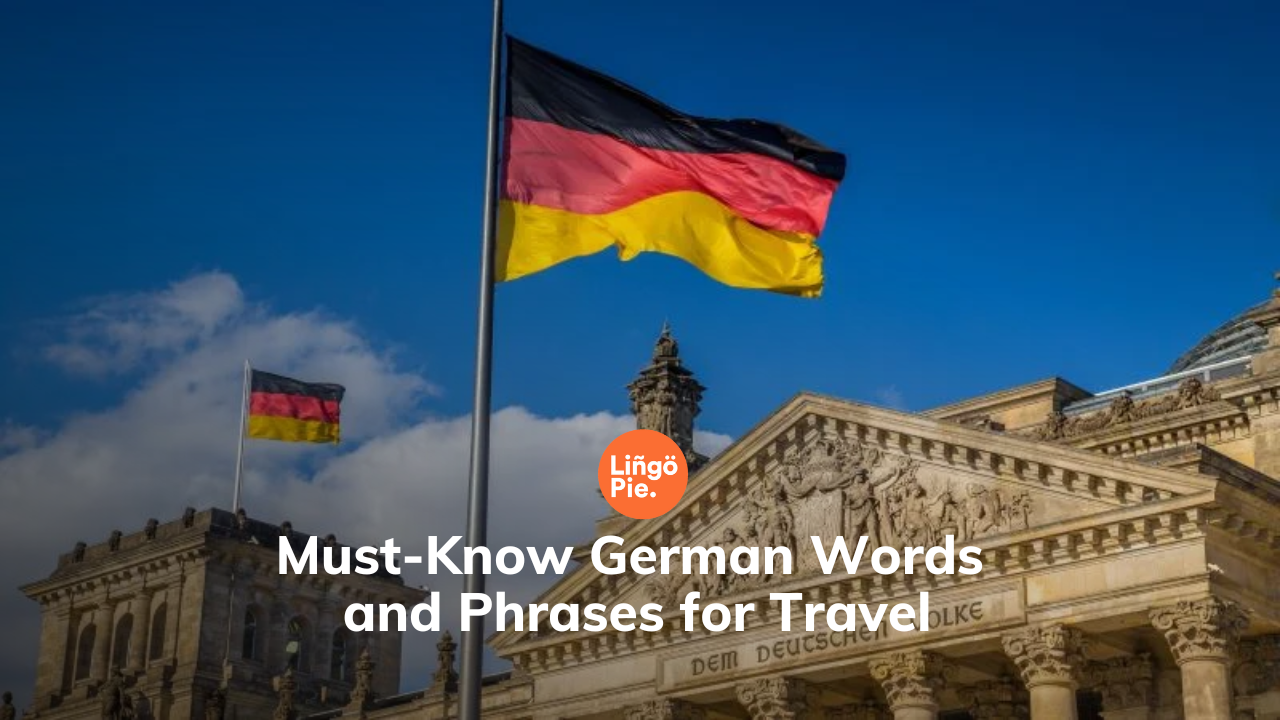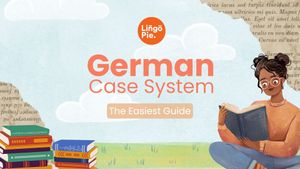You might already know how to say I love you in German with the classic phrase Ich liebe dich, but that alone will not help when you need to ask for the nearest train station or order lunch at a café. If you are traveling to a German-speaking country, learning a few basic phrases can make a big difference in your experience. It shows respect for the local culture, makes everyday interactions easier, and helps you feel more confident as you explore unfamiliar places.
In this article, you will find 50 essential German phrases that are especially useful for travel. These include greetings, common questions, polite responses, and simple vocabulary that locals actually use. With just a little practice, you can move through German-speaking cities with ease and connect more naturally with the people you meet.
- 100 Most Common German Words and Phrases
- 80+ Sweet German Terms Of Endearment For Loved Ones
- 13 German Traditions You Need To Know Before Your Next Trip

The German Language
German is spoken by 95 million native speakers, predominantly around Western Europe. It is an Indo-European language and belongs to the West Germanic group of the Germanic languages.
Learning German is relatively straightforward for people who speak English. You can expect to speak German at an intermediate level after around six months if you dedicate yourself to your studies.
You can learn basic German words from language-learning apps like Duolingo. Beyond that, you should engage with German music and German TV shows and movies.
Listening to native German speakers will help you to develop your listening comprehension and vocabulary.
This is a style of immersive learning that is very popular in the language-learning community. Check out Lingopie for their large catalogue of native German content hand-picked for language learners.
German Greetings and Pleasantries
Starting with proper greetings sets the tone for every interaction. Germans appreciate politeness, and these basics will immediately endear you to locals.
| German Phrase | Pronunciation | English Translation |
|---|---|---|
| Guten Morgen | GOO-ten MOR-gen | Good morning |
| Guten Tag | GOO-ten TAHK | Good day/Hello |
| Guten Abend | GOO-ten AH-bent | Good evening |
| Gute Nacht | GOO-te NAKHT | Good night |
| Hallo | HAH-lo | Hello |
| Auf Wiedersehen | owf VEE-der-zay-en | Goodbye |
| Tschüss | CHEWS | Bye |
| Danke (schön) | DAHN-ke (shern) | Thank you (very much) |
| Bitte (schön) | BIT-te (shern) | Please/You're welcome |
| Entschuldigung | ent-SHOOL-di-goong | Excuse me/Sorry |
| Wie geht's? | vee GAYTS | How are you? |
| Mir geht's gut | meer GAYTS GOOT | I'm doing well |
The Very Basics
Before we delve into specific German travel phrases, let's go over the very basics. These are common German phrases for everyday use.
Danke (schön)
Starting with one you may already know, we have "thank you (very much)". You may already be familiar with the more common German phrases from movies and your previous travels. Danke schön is one of the most useful phrases you can learn, so write it down!
Bitte
Sticking with the theme of manners, we have "please". Even learning just "please" and "thank you" in German will take you a long way. People love to see that you have made the effort to be polite in their mother tongue.
Ja/ Nein
Another must-know pair of words is "yes" and"no" respectively. Both are very useful words and should be memorized before you begin to learn German travel phrases.
Ich heiße…
To introduce yourself, you can say "my name is..."
Wie heißen Sie?
And ask your new friend in Germany "what is your name?"
Ich komme aus…
To introduce your home country or city, say ich komme aus…, meaning "I come from..."
Wie geht's?
Now for some more conversational German expressions. Wie geht's? is "how are you?"
Mir geht's gut
To which you can reply "I am good". Basic but easy for beginners.
Sprechen Sie Englisch?
This phrase means "do you speak English?"
It is written here in formal language which is customary when speaking to someone you do not know. But you can also ask sprichst du Englisch? if you are speaking to someone younger than you or someone you know well.
German Travel Phrases
Navigation and Transportation
Nothing beats the confidence of navigating a German city like a local. These phrases will help you move around efficiently and discover hidden gems.
| German Phrase | Pronunciation | English Translation |
|---|---|---|
| Wo ist...? | vo IST | Where is...? |
| Wie komme ich zu...? | vee KOM-me ikh tsoo | How do I get to...? |
| Wo finde ich...? | vo FIN-de ikh | Where can I find...? |
| der Bahnhof | der BAHN-hof | the train station |
| die Bushaltestelle | dee BOOS-hal-te-shtel-le | the bus stop |
| das Stadtzentrum | das SHTAT-tsen-troom | the city center |
| die Toilette | dee toy-LET-te | the restroom |
| der Flughafen | der FLOOK-hah-fen | the airport |
| Wann fährt der nächste Zug? | van FAIRT der NAYKH-ste TSOOK | When does the next train leave? |
| Wann kommt der Bus? | van KOMT der BOOS | When does the bus come? |
| Ich habe mich verlaufen | ikh HAH-be mikh fer-LOW-fen | I'm lost |
| Geradeaus | ge-rah-de-OWS | Straight ahead |
| Links | LINKS | Left |
| Rechts | REKHTS | Right |
Hotel and Accommodation Essentials
Whether you're staying in a boutique hotel in Hamburg or a cozy guesthouse in the Black Forest, these phrases ensure smooth check-ins and comfortable stays.
| German Phrase | Pronunciation | English Translation |
|---|---|---|
| Ich habe eine Reservierung | ikh HAH-be I-ne re-zer-VEE-roong | I have a reservation |
| Haben Sie ein Zimmer frei? | HAH-ben zee ine TSIM-mer FRY | Do you have a room available? |
| Für wie viele Nächte? | fuer vee FEE-le NAYKH-te | For how many nights? |
| Eine Nacht | I-ne NAKHT | One night |
| Drei Nächte | dry NAYKH-te | Three nights |
| Das Wochenende | das VOKH-en-en-de | The weekend |
| Ist das Frühstück inklusive? | ist das FRUE-shtuek in-kloo-ZEE-ve | Is breakfast included? |
| Wann ist Check-out? | van ist CHECK-out | When is check-out? |
| Die Rechnung, bitte | dee REKH-noong BIT-te | The bill, please |
| Können Sie mir helfen? | KERN-nen zee meer HEL-fen | Can you help me? |
Dining Like a Local
German cuisine extends far beyond bratwurst and beer (though those are delicious too!). These phrases help you explore authentic flavors and connect with restaurant culture.
| German Phrase | Pronunciation | English Translation |
|---|---|---|
| Haben Sie einen Tisch frei? | HAH-ben zee I-nen TISH FRY | Do you have a table available? |
| Die Speisekarte, bitte | dee SHPY-ze-kar-te BIT-te | The menu, please |
| Was empfehlen Sie? | vas emp-FAY-len zee | What do you recommend? |
| Ich hätte gern... | ikh HET-te GAIRN | I would like... |
| Ich bin Vegetarier/in | ikh bin ve-ge-TAH-ree-er/in | I'm vegetarian |
| Ohne Fleisch, bitte | OH-ne FLYSH BIT-te | Without meat, please |
| Das war köstlich! | das var KERST-likh | That was delicious! |
| Die Rechnung, bitte | dee REKH-noong BIT-te | The check, please |
| Ist Trinkgeld inklusive? | ist TRINK-gelt in-kloo-ZEE-ve | Is tip included? |
| Guten Appetit! | GOO-ten ah-pe-TEET | Enjoy your meal! |
| Ein Bier, bitte | ine BEER BIT-te | One beer, please |
| Wasser, bitte | VAS-ser BIT-te | Water, please |
Shopping and Exploring
From Berlin's vintage markets to Munich's traditional shops, these phrases help you discover unique finds and interact with shopkeepers.
| German Phrase | Pronunciation | English Translation |
|---|---|---|
| Wie viel kostet das? | vee FEEL KOS-tet das | How much does this cost? |
| Kann ich das anprobieren? | kan ikh das AN-pro-bee-ren | Can I try this on? |
| Haben Sie das in einer anderen Größe? | HAH-ben zee das in I-ner AN-de-ren GRER-se | Do you have this in another size? |
| Wo ist die Kasse? | vo ist dee KAS-se | Where is the checkout? |
| Nehmen Sie Kreditkarten? | NAY-men zee kre-DEET-kar-ten | Do you accept credit cards? |
| Kann ich mit Bargeld bezahlen? | kan ikh mit BAR-gelt be-TSAH-len | Can I pay with cash? |
| Haben Sie eine Tüte? | HAH-ben zee I-ne TUE-te | Do you have a bag? |
| Das ist zu teuer | das ist tsoo TOY-er | That's too expensive |
| Ich schaue nur | ikh SHOW-e noor | I'm just looking |
| Öffnungszeiten | ERF-noongs-tsy-ten | Opening hours |
| Verkauf | fer-KOWF | Sale |
| Haben Sie...? | HAH-ben zee | Do you have...? |
Emergency and Help Phrases
While we hope you never need these, being prepared with emergency phrases provides peace of mind and could be crucial in unexpected situations.
| German Phrase | Pronunciation | English Translation |
|---|---|---|
| Hilfe! | HIL-fe | Help! |
| Rufen Sie die Polizei! | ROO-fen zee dee po-li-TSY | Call the police! |
| Ich brauche einen Arzt | ikh BROW-khe I-nen ARTST | I need a doctor |
| Wo ist das Krankenhaus? | vo ist das KRAN-ken-house | Where is the hospital? |
| Ich verstehe nicht | ikh fer-SHTAY-e nikht | I don't understand |
| Sprechen Sie Englisch? | SHPREKH-en zee ENG-lish | Do you speak English? |
| Können Sie langsamer sprechen? | KERN-nen zee LANG-za-mer SHPREKH-en | Can you speak slower? |
| Ich habe mein... verloren | ikh HAH-be mine... fer-LO-ren | I lost my... |
| Mein Pass ist weg | mine PASS ist vek | My passport is gone |
| Können Sie mir helfen? | KERN-nen zee meer HEL-fen | Can you help me? |
| Es tut mir leid | es TOOT meer LYDE | I'm sorry |
| Ich komme aus... | ikh KOM-me ows | I'm from... |
Summing Up: Must-Know German Words and Phrases
This has been a comprehensive guide to beginner German phrases for everyday life, introductions, travel and restaurants.
Now you are well-equipped with the language necessary for talking to taxi drivers, navigating souvenir shops and ordering food.
Traveling in a German-speaking country is much more fun when you know these things. Interesting things happen on vacation when you can talk with the locals!
So, start learning German today with Lingopie. This streaming site also offers high-quality content in 7 other languages.
FAQs relating to essential German phrases for travelers
Now, let's look at some frequently asked questions relating to German travel phrases.
What is the best way to learn German?
The easiest way to learn German is to use a variety of resources and study a little every day. You will learn German easily with the help of German TV shows and movies, music, online German courses and language-learning apps that focus on German grammar and vocabulary.
What is a popular German saying for native German speakers?
There are a few popular and common phrases for natives. You might hear a native German speaker say Daumen drücken!, meaning "fingers crossed!" or in Teufels Küche sein Wo finde ich den Bahnhof?, which is "to be in hot water" (literally "to be in the Devil's kitchen"). There are many funny words and phrases in the German language to explore as you learn.
Which countries speak German?
German is an official language in Austria, Belgium, Germany, Liechtenstein, Luxembourg and Switzerland. It is also spoken in parts of Italy and Poland. It is the most widely-spoken language in the European Union.







![7 Best Apps To Learn German On Your Own [REVIEWED]](/blog/content/images/size/w300/2026/01/best-apps-to-learn-german-on-your-own.png)
![6 Best German Translator Apps For Beginners [TESTED]](/blog/content/images/size/w300/2026/01/Best-german-translation-apps-for-beginners-.jpeg)
